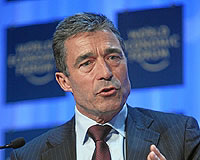| . |  |
. |
Ankara (AFP) May 12, 2010 Russia on Wednesday signed a 20-billion-dollar (15.8-billion-euro) deal to build Turkey's first nuclear power plant as President Dmitry Medvedev hailed expanding ties with the NATO member. "This agreement opens a new page in our cooperation... Our talks today showed that Turkey and Russia are strategic partners not only in words but in deeds," Medvedev told a joint news conference with Turkish Prime Minister Recep Tayyip Erdogan. The deal to build and operate the plant at Akkuyu, on Turkey's Mediterranean coast, was one of some 20 agreements signed by the two countries which Medvedev said would generate about 25 billion dollars of investment. "It really looks rather impressive," he said. Erdogan said construction of the plant would begin after both parliaments ratify the accord, and take seven years to complete. Russia has long looked to build Turkey's first nuclear power plant, but a Turkish court last year scrapped a tender won by a Russian-led consortium to build four reactors with a total capacity of 4,800-megawatts at Akkuyu. Wednesday's deal "is a very big contract," Sergei Kiriyenko, the head of Russian nuclear corporation Rosatom, told reporters. "An approximate price of such a project is around 18-20 billion dollars." Kiriyenko said Russia would own the plant -- the first Russian-owned plant outside the country -- holding "no less than a controlling stake". Erdogan said he and Medvedev discussed projects to carry Russian gas and oil to world markets via Turkey, which has emerged as a major transit hub between East and West. He cited Moscow's South Stream pipeline project to supply gas to Europe bypassing Ukraine, as well as Ankara's proposal for an oil pipeline from Turkey's Black Sea port of Samsun to the Mediterranean port of Ceyhan, which already serves as a terminal for conduits from Azerbaijan and Iraq. "We are determined to take this step," he said of the Samsun-Ceyhan conduit, which, he added, would be completed with a joint refinery at Ceyhan. The construction of the pipeline, which aims to ease tanker traffic in the congested Bosphorus Strait, would cost three billion dollars, Russian Deputy Prime Mininster Igor Sechin told reporters. Last year, Turkey secured a Russian pledge to supply oil to the conduit in return for backing South Stream. Ankara, which also backs the European Union's rival Nabucco pipeline, agreed to allow Russian exploration work for the project in its Black Sea waters. As the two countries expressed a desire to triple trade volume to 100 billion dollars over the next five years, Medvedev said their national currencies -- the rouble and the lira -- should be used in bilateral trade. "We need to think how to dramatically expand the use of national currencies," he told a business forum, reiterating that both economies were too dependent on global reserve currencies, primarily the US dollar. The idea was floated in a confidential new foreign policy strategy prepared for Medvedev and published by Newsweek Russia this week. The two countries also signed a deal mutually lifting visas for stays of up to 30 days, a major boost to investors and millions of Russians holidaying at Turkey's Mediterranean coast each year. Despite sometimes shaky political ties, economic exchanges between the two countries have boomed since the fall of communism. In 2009, their trade volume stood at 22.9 billion dollars, making Russia one of Turkey's top commercial partners. Russia's military intervention in Georgia in 2008 briefly strained relations with Turkey, which has close ties with the former Soviet republic, its northeastern neighbour. Russia is Turkey's main gas supplier, providing about 60 percent of the country's gas imports.
Share This Article With Planet Earth
Related Links Learn about the Superpowers of the 21st Century at SpaceWar.com Learn about nuclear weapons doctrine and defense at SpaceWar.com
 NATO chief keen to work closely with new British PM
NATO chief keen to work closely with new British PMBrussels (AFP) May 12, 2010 NATO Secretary General Anders Fogh Rasmussen on Wednesday congratulated Conservative leader David Cameron on becoming prime minister, saying Britain's commitment to the alliance was not in doubt. "I warmly congratulate David Cameron on becoming prime minister of the United Kingdom," the NATO chief said after Labour leader Gordon Brown resigned Tuesday and a new Conservative-Liberal Democrat ... read more |
|
| The content herein, unless otherwise known to be public domain, are Copyright 1995-2010 - SpaceDaily. AFP and UPI Wire Stories are copyright Agence France-Presse and United Press International. ESA Portal Reports are copyright European Space Agency. All NASA sourced material is public domain. Additional copyrights may apply in whole or part to other bona fide parties. Advertising does not imply endorsement,agreement or approval of any opinions, statements or information provided by SpaceDaily on any Web page published or hosted by SpaceDaily. Privacy Statement |